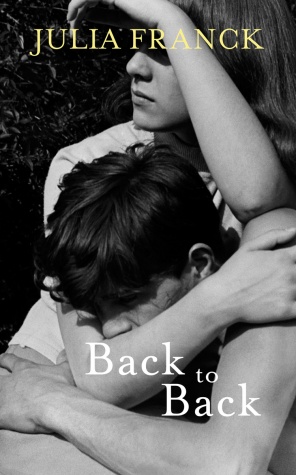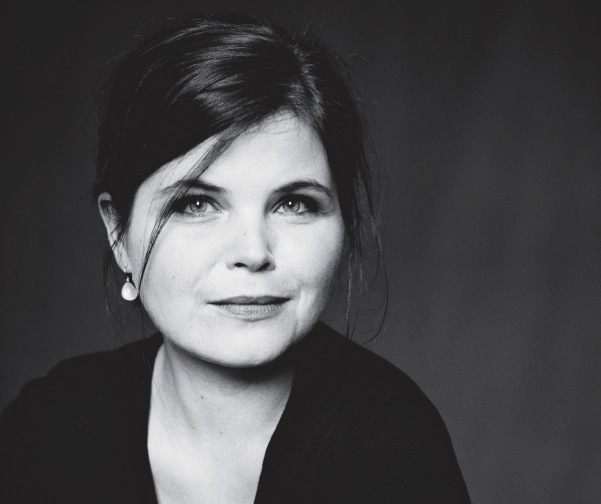Book Review: “Back to Back” — A Powerful Portrait of East German Trauma, Personal and Political
Using her family’s history as a springboard, Julia Franck has created exemplary figures forced to navigate the treacherous shoals of her country’s history.
Back to Back, by Julia Franck. Translated from the German by Anthea Bell. Grove, 320 pages, $24.
By Tess Lewis
Poet Philip Larkin, no mean connoisseur of misery, wrote jauntily of the suffering passed from one generation to the next, deepening and “spreading like a coastal shelf.”
They fuck you up, your mum and dad.
They may not mean to, but they do.
They fill you with the faults they had
And add some extra, just for you.
In the German writer Julia Franck’s novels, it is mostly the mums who damage their children. Cold, withholding, ruthlessly narcissistic, if not mentally unbalanced, these women are in a completely different league than Bruno Bettelheim’s refrigerator mothers. Those of Franck’s male characters who pass misery on to others tend to spread it outside the family through sexual predation, abuse or bullying. It is with a strong stomach, indeed, and a bracing lack of sentimentality, that Franck has charted many of the finer and rather less fine points of family dysfunction in her fiction. Yet what differentiates Franck’s novels from the majority of unhappy family stories is her skill in portraying the overt as well as the insidious effects that brutal political and social systems have on intimate emotional ecosystems.
Franck witnessed more than her share of these effects directly and indirectly. Born in East Germany in 1970, she moved to West Berlin with her mother and sister when she was eight. Although both of her grandmothers were Jewish, they managed to survive World War II and continued to live in Germany after the war. Franck mines this family history in her two most recent novels, The Blind Side of the Heart and Back to Back, taking her grandmothers’ lives as departure points for imaginative reconstructions of personal traumata.
The Blind Side of the Heart opens in the final days of World War II. Helene Würsich, a nurse in a hospital in eastern Germany flees with her young son Peter from the advancing Red Army, having already been gang raped by Soviet soldiers in her home. At an overcrowded train station, Helene tells her son to sit on the bench while she goes to get tickets. Peter clings to her and begs her to let him go with her, but she firmly disentangles herself and orders him to hold their small suitcase on his lap and wait for her. And wait he does, hour after heart-breaking hour.
This was no spur of the moment decision—in the bottom of Peter’s suitcase were his papers, a note with his uncle’s address and a stash of money. Helene’s own papers had been falsified long before to erase her Jewish ancestry, so Peter’s survival was as assured as could be expected in Germany in 1945. For her part, Helene felt only relief. A childhood overshadowed by her mother’s mental illness, the death of a man she deeply loved and marriage to an emotionally abusive, contemptuous pro-Nazi engineer have left her impenetrably closed in on herself. Unable or unwilling to imagine the effect of her abandonment on Peter, she “was cheered by the idea that he would be better off and have someone to talk to him about this, that and the other, that he’d see sunlight in the evening.”
Franck’s own father was abandoned by his mother at a train station in 1945. The Blind Side of the Heart grew out of Franck’s wish to understand the circumstances surrounding such a decision. In cool, distanced prose and with enormous empathy for all of her characters, Franck chronicles three generations of the Würsich family from the turn of the century to the mid-1950s. The tremendous pressures of history are only lightly touched on in passing references to headlines or in period detail but its burden on the characters is palpable. As a young teenager, Helene was able to escape the suffocating atmosphere of her family home in a small provincial town for the freedom of Weimar era Berlin. That liberation was short-lived so its reversal was all the more traumatic.
There is no escape for the children in Franck’s subsequent and most recent novel Back to Back. Set in the late 1950s and early 60s in a small town on the outskirts of East Berlin as the Wall was being built, this book’s atmosphere is far more claustrophobic. Franck uses a smaller canvas and confines the novel’s action to a single decade and one generation. The domineering mother Käthe, a sculptor who believes as zealously in her communist ideals as in her art, is too self-absorbed to take much notice of her two children, Thomas and Ella, unless it is to berate them.
Like Hansel and Gretel, Thomas and Ella must fend for themselves. Käthe leaves them alone when they are only ten and eleven years old for weeks at a time while she goes to work in a local quarry. After one prolonged absence, the two children decide to frighten Käthe by running away. They return after three days, almost dead of hypothermia, only to find that she had not noticed they had left. Thomas and Ella become inseparable, almost symbiotic. One of their few consolations is sitting back to back, telling each other stories about their father, who was killed in the War.
Neglect, they gradually realize, is a far better option than Käthe’s attention. To punish her “magpie” daughter for sneaking food from the pantry, Käthe gives Ella a special present on her sixteenth birthday: a mound of sugar she must eat before she will get any other food. Much worse, Ella is raped not only by her stepfather, but by a Stasi “lodger” planted in Käthe’s home. Like Helene, Käthe is unable or unwilling to recognize her child’s suffering. She must stay in the system’s good graces to maintain her privileges and commissions, after all. Not surprisingly, Ella develops eating disorders and compulsive behavior. Käthe simply has her hospitalized and sedated for a “sleeping cure.”
Thomas fares only marginally better. Forced to pose nude for hours in a freezing studio crowded with Käthe’s cronies effusing about the “new society” they were creating, Thomas only sporadically tunes in to their endless talk. But even snippets are enough for him to see that they are “[t]alking themselves into dependency and compliance, not out of it.” Any illusions about the individual sharing in the common good had been starved out of Thomas long before. Sensitive and extremely intelligent, Thomas longs to become a writer but is denied a place in university when he refuses to join the Free German Youth. Embittered by Thomas’ stubborn rejection of Party formalities and contemptuous of the elite to which she once belonged as a professor’s daughter, Käthe refuses to use her connections to help her son. Instead, she insists he work in a quarry. “Those who want to change society had better begin with their own children,” she declares. Only when Thomas comes home half-dead from his co-workers hazing, does she relent and find him a position as a hospital orderly.
Käthe, like Helene in The Blind Side of the Heart, has suffered greatly and Franck briefly sketches in the past that has made her so urgently desire, whatever the cost, to adapt to and be accepted by “a Germany that had cast her out a good twenty years ago, when those like her were no longer wanted or needed, were banished, hunted, killed.” Käthe, like Franck’s maternal grandmother, the Jewish sculptor Ingeborg Hunzinger, fled to Italy to escape the Nazis. Forced to return before the War was over, she hid in the forest. After the War she devoted herself heart and soul to the German Democratic Republic, glorifying its heroes and the ‘New Man’ through ponderous social realist statues.
Thomas and Ella are just as trapped in Käthe’s desperate ideological devotion as she is. Ella is too frightened to denounce the abusive lodger since that would endanger Käthe’s standing with the Party. Thomas tries to resist, but he is too emotionally dependent to break free. Time and again he falls under the sway of her fervor: “Thomas wanted to turn away, but he couldn’t. There it was again, the noose round his neck, the noose round his legs, the gleam in her eyes. He needed a pair of scissors to cut himself free.” The one time Thomas tries to break free and turns to Käthe’s brother, whom she despises for having emigrated to America, his uncle refuses to help and tells Thomas “You know perfectly well you can’t do that to your mother. She loves you.”
Thomas finds a makeshift escape first in his poetry and then in love, but neither of these can ultimately save him. His plight is made all the more poignant by Franck’s acknowledgment on the book’s final page that the poems and the essay interwoven in the text were written by her uncle, Gottlieb Friedrich Franck, who took his own life at eighteen in 1962. “Get out as early as you can,” Larkin’s poem advises. But what if there is no way out?
Using her family’s history as a springboard, Franck has created exemplary figures forced to navigate the treacherous shoals of her country’s history. None are unscathed, certainly not the survivors. Her characters’ stories, for all their horror, are never less than gripping. Not only are her settings meticulously researched and rendered, but she vividly conveys pervasive atmospheres of dread. What raises Franck’s novels above standard tormented family drama, although there is plenty of that, is the uneasy balance she strikes between social and psychological forces: did the political systems warp their citizens’ souls or was it the wounded souls that helped those systems flourish?
Tess Lewis is an essayist and translator from French and German. Her translations of the Swiss poet Philippe Jaccottet’s Seedtime: Notebooks 1954-79 was published recently by Seagull Books . She is curator of the 2014 Festival Neue Literatur.
Tagged: Anthea Bell, Back to Back, German fiction, Julia Franck, Tess Lewis


